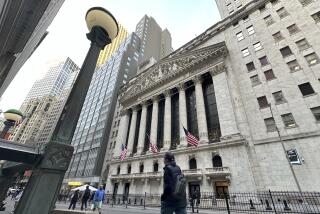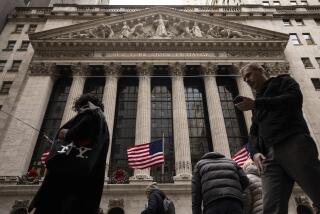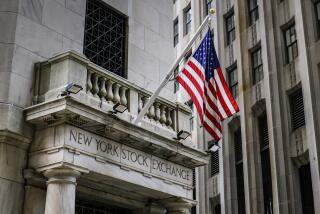Why the idea of ‘Brexit’ — Britain’s exit from the European Union — is shaking up markets worldwide
Already the pound has fluctuated widely, money has moved into bonds, London stocks have gyrated and central banks in the U.S. and Europe are looking at contingency plans to stave off market shocks if Britain votes Thursday to leave the European Union.
An overreaction? Perhaps, but a strong consensus among policymakers, economists and investors says that the damage from Britain exiting the EU – Brexit, it’s dubbed – would be significant. A decision to leave would probably push Britain into recession, add impetus to secession movements across Europe and jolt financial markets around the world.
Britain could lose 1% to 6% of its annual economic output, a dozen major U.S. and European banking firms and international economic groups have estimated, although supporters of the Leave campaign dispute that.
Despite the risk, the average of the most recent polls shows the two sides essentially tied, with a dwindling number of undecided voters potentially holding key to the referendum. A poll released Sunday showing the Remain side pulling slightly ahead, although still well within the survey’s margin of error, sent markets soaring on Monday.
Though the U.S. economy is better insulated than most from the risk of market turmoil, many on this side of the Atlantic are on edge too. The Federal Reserve held off raising interest rates last week, in part because of the risk of a Brexit. Investment specialists have put some transactions on ice and are telling clients to sit tight, said Winnie Sun of Sun Group Wealth Partners in Irvine.
The British referendum has added to uncertainties from the coming presidential election and lingering anxieties about China’s economic slowdown, which threw markets into turmoil earlier this year.
“What I’m concerned about is the unpredictable,” said Hal Scott, a Harvard law professor and expert on international finance and securities regulations. His biggest worry about a Brexit is the possibility that it could set off a panic that leads to a global financial crisis, something akin to what happened in 2008 after the Wall Street firm Lehman Bros. filed for bankruptcy.
Big banks may be better capitalized than a decade ago, but Scott argues that the U.S. is less equipped today to respond to a run on the financial system. That’s because the Dodd-Frank financial reform legislation, adopted in part to prevent future bailouts of big financial firms, would prevent some of the moves government officials had available in 2008 to rescue broker dealers, hedge funds, insurance firms and other so-called non-banks, which are vital to the stability of the financial sector.
“Hopefully, people have more faith in the system and won’t run on it, but what if they do?” Scott asked.
Central bankers aren’t taking any chances; they’ve issued stark warnings about the risks, and some have pledged to backstop markets if Britain does vote to leave.
Even so, there’s little doubt that a decision to leave would cause severe stress for the United Kingdom, the world’s fifth-largest economy, and it would strain an already weary Europe, economically and politically, and ultimately lap onto the shores of America.
The British pound has slid about 3% against the dollar since the start of this month, half of that June 10 when a poll indicated a slim majority favoring the Leave campaign. Economist Mark Zandi of Moody’s Analytics predicts the British currency would fall as much as 20% – to about $1.15 to the pound – in the immediate days after a Brexit.
A sharp drop in the pound, by itself, would tend to boost Britain’s trade; weaker currency makes exports cheaper in foreign markets. The problem is that an exit from the EU would require the United Kingdom to negotiate fresh trade deals with partners in Europe and elsewhere, including the U.S. That would be neither quick nor easy, which means Britain could be subject to a long period of tariffs and other barriers slowing commerce.
Britain also stands to lose one of its most attractive commercial attributes – its global standing as an open and cosmopolitan economy. Among the strongest motivations behind the Leave side of the debate is a desire to limit immigration from the continent, particularly Eastern Europe. That sentiment has deepened amid an influx of refugees and rising fears of radical Islamic elements at home.
Sharp restrictions on immigration into Britain are almost certain to follow any vote to leave the EU. That would probably hammer the country’s inflated property market, which in turn would crimp consumer spending, said Jean Ergas, an economist who teaches international finance at the NYU School of Professional Studies.
Then there is the uncertainty of what a Brexit would mean for London, for decades the financial center of Europe. Citigroup and JPMorgan Chase & Co., for example, have warned that they may move operations and staff out of Britain should voters choose to leave the EU.
“One realistic outcome is that we lose the ability to passport our banking and trading services into Europe,” said Jamie Dimon, JPMorgan’s chief executive, in remarks this month in Bournemouth, one of six locations in Britain where the company has nearly 16,000 workers. “So if the UK leaves the EU, we may have no choice but to reorganize our business model here.”
Any economic fallout is likely to be compounded by what some see as an inevitable political crisis in the aftermath of a Brexit.
British Prime Minister David Cameron called the referendum to fulfill a pledge to restive members of his Conservative Party but has campaigned for remaining in the EU. If the Leave side wins, he is likely to be pushed out, creating a political vacuum at a time when leadership will be needed most, said Jacob Funk Kirkegaard, a European economy expert at the Peterson Institute for International Economics.
The spillover to the rest of Europe would be mixed, Kirkegaard said, felt most by Britain’s closest trading partners such as Ireland and the Netherlands, but unlikely to drag the eurozone or the larger EU into a recession. That said, he and many other analysts worry that a Brexit would set a new precedent of a state leaving the EU.
In every major country in the EU, there are nationalistic political groups unhappy with the existing political order and wanting greater sovereign control of immigration and fiscal policies.
“Is this the first chink in the armor of a breakup of Europe?” asked Chris Rupkey, managing director at Union Bank in New York. “It’s something that could potentially change the world order, which markets could view as unsettling and destabilizing.”
For that reason and other more immediate considerations, President Obama and his cabinet have urged Britain to remain in the EU. The Obama administration is in the middle of negotiating a free-trade deal with the EU, and Obama said in a visit to London in April that a separate bilateral agreement with Britain wouldn’t happen “any time soon.”
Most economists reckon the U.S. would be able to absorb the ripples from a Brexit. The American economy depends mostly on domestic spending, which has picked up steam in recent months.
Trade between the U.S. and the Britain is fairly balanced and accounts for just 3% of the U.S. total exchange of goods with all countries.
A deeper Brexit spillover to Europe would hit U.S. exports more; American trade with all of the EU represents about 19% of total U.S. imports and exports. Any spread of economic problems into Europe would also compound the risks of stronger and longer shocks to U.S. stock and financial markets, which could damage confidence among businesses and consumers.
“Yes, it is worrisome because you don’t know what the fallout will be,” said Joshua Feinman, chief economist and managing director of Deutsche Asset Management in the Americas. “It’s just a ball of uncertainty that could cast a pall over activity in Europe for a while, and some of that could wash onto U.S. shores.
“At a time when the world is struggling with modest growth and you’re trying to get out of this low-interest rate world, it’s not what the doctor would order.”
Follow me at @dleelatimes
UPDATES:
9:03 a.m.: This article was updated to reflect Monday’s market response to the latest polls.
The article was first published at 3:00 a.m.







